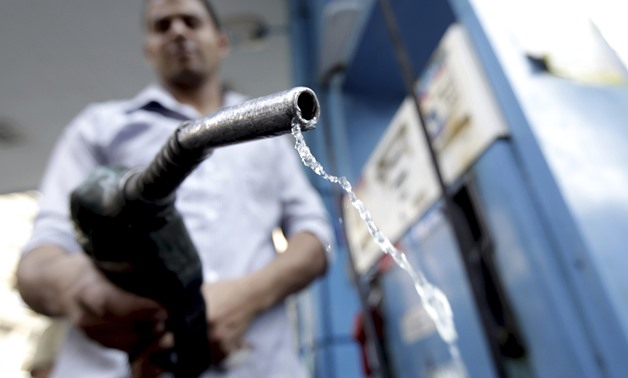
A worker holds up a fuel pump nozzle after filling up the tank of a car at a petrol station in Cairo October 3, 2012. REUTERS/Mohamed Abd El Ghany
CAIRO - 4 July 2019: Egypt continues implementing its reform program as the government is expected to lift the fuel subsidies after it has gradually cut them several times since 2014.
In June 2018, Egypt raised fuel prices for the fourth time since 2014 to meet the International Monetary Fund loan's terms that entail the complete removal of fuel subsidies.
In June 2018, Minister of Petroleum Tarek el-Molla said that the total cost of oil products subsidy over the past five years hit LE 517 billion, explaining that generic subsidies have a multitude of negative consequences on the Egyptian economy.
Molla further explained that those who actually deserve petroleum subsidies did not benefit from the system, which has proven unpractical over the years.
Molla added that the current subsidy system has a negative impact on social justice due to the fact that the high-income segments also benefit from these subsidies, thereby decreasing the amount of money the government has to spend on the public. There is a clear difference between equality and equity, implied Molla.
Molla also explained that increasing the prices of petroleum products saves LE 50 billion for the country, money that he suggests could be allocated elsewhere to benefit people.
Instead, this money is expected to be allocated to healthcare or educational services to ensure better human, social and economic development for all, and ensure equity and social justice.
Between equality and equity, much of the research has shown that equity leads to social justice and economic, as well as human and social development, while equality does not necessarily do so, as it limits competition and leaves people on an unequal footing.
The Egyptian government has spent LE 20 billion to develop unsafe areas and provide decent housing for the residents of these areas, Hany Younis, spokesperson for the Ministry of Housing, said in 2018.
Two businessmen said they endorse the state's step towards removing the last segment of fuel subsidies, arguing that subsidizing fuel, according to the current way, negatively affects the poor.
They asserted that despite price increase, electricity prices remain competitive compared to neighboring industrial countries.
Engineer Magd al-Din al-Manzalawi, member of the Board of Directors of the Egyptian Businessmen Association,said that the aim of such step is to make sure that the needy citizens benefit from the government subsidies.
Manzalawi told Egypt Today that such step cannot be achieved unless higher class citizens bear to pay the value of energy.
Additional reporting by Lolwa Reda


Comments
Leave a Comment